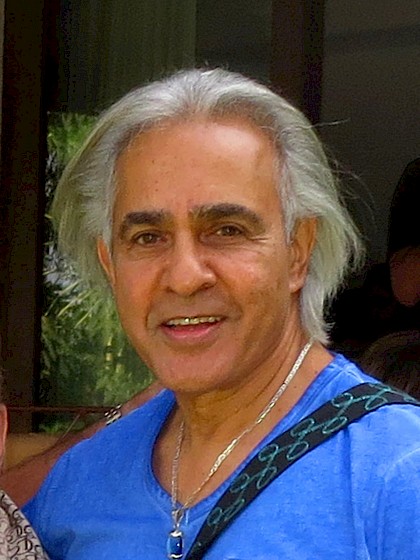Biddu joins the Supreme Songs roster!
The first east Indian producer to be showered with cascades of accolades and high praise outside his home country, and then to become the guru of Hindi-pop back inside it, Biddu worked for years in his homeland before he decamped to England landing in London in the late 1960s. He worked for a time as a chef for the American Embassy and then rented studio time and recorded his debut single.
The song didn't do anything, however, 1972 saw Biddu score “Embassy”, a film starring Richard Roundtree. Late the following year, he was introduced to the transplanted Jamaican singer Carl Douglas, who recruited Biddu to record his next single "I Want to Give you my Everything". The B-side was cut in just ten minutes and A&R insisted that it become the A-side. It was, of course, "Kung Fu Fighting" which ultimately sold over 9 million copies worldwide.
In 1975 Biddu created the Biddu Orchestra, and recorded the LP “Blue Eyed Soul” with the album's first single, "Summer of "42"" charted in the U.K. chart. With that song still fresh, Biddu then produced vocalist Tina Charles with "I Love to Love (But my Baby Just Loves to Dance)" ignited her own successful solo career in early 1976.
Biddu returned with his own “Rain Forest” LP, followed by Eastern Man in 1977, credited to Biddu & His Orchestra. Meanwhile, he added veteran soul singer Jimmy James to his select stable and that same year's “Life” LP unreeled two smash disco hits, "I'll Go Where your Music Takes Me" and "Disco Fever". Biddu then returned with his final U.K. album “Futuristic Journey”.
In 1979, Biddu returned home to launch a new era in local Pop, first scoring some songs for the Indian Film “Qurbani”. Composed specifically for the soundtrack, he recorded "Aap Jaise Koi" with 15 year old vocalist Nazia Hassan.. Working with Hassan and her brother Zoheb, the producer was behind four wildly successful albums with the duo, as their disco debut Disco Deewane was followed by three more heavy hitters; :”Star” in 1982, “Young Tarang” two years later , and “Hotline” in 1987.
Biddu next turned his attention to vocalist Shweta Shetty, both writing and producing the “Johnny Joker” LP in 1993. In 1995, Biddu produced “ Made in India”. Featuring Alisha Chinoy, the album became the best-selling Hindi Dance album ever and featured a slick handful of Western styled videos -- a sure selling point for India's newly-launched MTV set.
Biddu shot back into the spotlight in 1995 with a remix treatment of the now classic Hussan material for an all new dance album “The Biddu Experience”. Reworked with elements of techno and truly contemporary dance, the album not only revitalized and completely updated Biddu's favourite tracks, but also continued to further the path Hindi-pop would follow.
His search for a new protégé ended with the discovery of another brother sister team, Shaan Shantanu Mukherjee and Sagarika Mukherjee, who scored with the Biddu-produced “Naujawan” LP in 1996. With a seemingly endless supply of ideas and vision, Biddu spent the rest of the 1990s working with a variety of musicians, including the Indian girl group the Models, and Sonu Nigam, as well as continuing his collaboration with Chinoy on her “Dil Ki Rani” LP.
Into the new millennium, he produced two hit albums with Sansara, “Yeh Dil Sun Raha Hai” and “Habibi”
Biddu also continued pursuing his own solo interests with the 1999 album “Eastern Journey” an ambitious experiment which blended Indian pop with Western flair and strong jazz elements.
(edited from article by Amy Hanson, All Music Guide)
